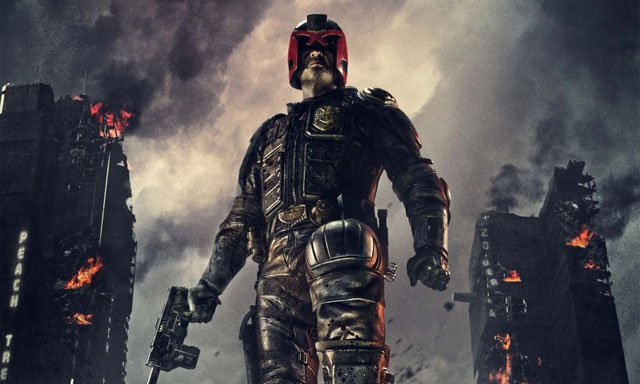
Film: Dredd
Country: UK/USA/India
Year of Release: 2012
Director: Pete Travis
Screenwriter: Alex Garland
Starring: Karl Urban, Lena Hedley, Olivia Thirlby
♥♥♥½
I’ve got admit, I didn’t have very high hopes for Dredd 3D, the latest onscreen reincarnation of the well-loved 2000 AD character. In fact, I’ve become so inured to comic-book heroes being drained of all vitality, that I didn’t even expect the film to be remotely interesting. And so, I was surprised to find myself enjoying a franchise-based movie for the first time in what seems like many, many years.
From the beginning, there is something different about the film. For starters, observant types might notices the lack of familiar Hollywood logos and the presence of the Indian monolith Reliance Entertainment. They might also notice that the film has a very different tone, and South African viewer might register that there’s something familiar about elements of the landscape as well as many of the extras.
That’s partially because, although the film is set in the irradiated wasteland of Megacity, a dystopian future that doesn’t look a million mile away from today’s metropolises of LA, Johannesburg or Mumbai, it was actually shot in Cape Town and is effectively an Indian/
South African/American production, fuelled by Hollywood money – which these days is a fairly amorphous concept, since Reliance actually has substantial investments in several Hollywood company, including Steven Spielberg’s Dreamworks, as well as several other high-end studios.
In the sprawling Megacity, which runs from Boston to Washington DC, 400 million citizens live in perpetual fear of the criminal elements that have taken hold of society, and also it seems, of the Judges, the law enforcement offices who attempt to bring some order to this untrammelled chaos.
The Judges, though, while they might be on the right side of the law, don’t do much of a job of bringing what might be called peace to the situation. Given the multiple roles of law enforcers, judges and executioners, their methods are every bit as violent and unfeeling as the criminals. The judges are not, shall we say, big on sentiment.
At the top of this post-apocalyptic judicial system is the legendary Judge Dredd, who in this particular episode – you can smell the sequels in the distance – is charged with testing a rookie judge named Cassandra Anderson who has been blessed with psychic abilities. Dredd and his Judge-in-training make their way to the scene of what appears to be a routine homicide which has been committed in the notorious Peach Trees mega-block – a 200-story vertical slum run by the pitiless Ma-Ma clan which is flooding the city with a new drug called slo-mo that slows time down – and makes things look very pretty indeed, filling the screen with hallucinogenic sparkles.
But when the Judges arrest one of Ma-Ma’s chief henchmen, the psychotic matriarch has the entire building shut down and orders her clan to hunt the judges to the death. As the building literally locks down, Dredd and Anderson find themselves engaged in a relentless fight for survival.
And so, we’re given a kind of mash-up of Training Day, Die Hard and countless other action movies. Infused with a good dash of ultraviolence, the film is rendered with a visual aesthetic that sensitive viewers might find disturbing. But while such viewers might have a problem with the violence, executed in a slow-motion that illustrates, for example, exactly what happens when a bullet enters and exits a human face, there’s also a strangely appealing beauty to the way in which the violence is rendered.
Make no mistake, Dredd is no masterpiece. It’s pretty derivative and the acting is, for the most part, not that relevant, (although Thilby and Hedley give pretty decent performances). But something about the way the film is made, the manner in which its textures fill the screen, differentiates it from the mass of commercial films with which it shares such a close relationship.
Then there is the way in which the film contains itself so rigorously, both in terms of its lock-down narrative and the fact that it is such a singularly minded action flick. The screenwriting, from Alex Garland (The Beach, 28 Days Later), is better than we might expect in this kind of film, and the plot, although not exactly full of surprises, doesn’t feel obligated to follow the stock-standard formula. The result is that I was far more engaged than I would normally be with this kind of action-soaked shoot-em-up.
Ultimately, Dredd’s key factor is simply its difference. As the monolith of Hollywood starts to crack at its generic seams, the entrance of other global actors on to the green-screened digital stage, might, just might, help to make the output of mainstream American movies marginally more interesting. To be honest, it would be difficult to make them less so. The fact that Dredd, although perilously close to being a B-movie, has received fairly widespread critical acclaim, suggests that there are many other film writers who share my sentiments.
© PETER MACHEN 2017